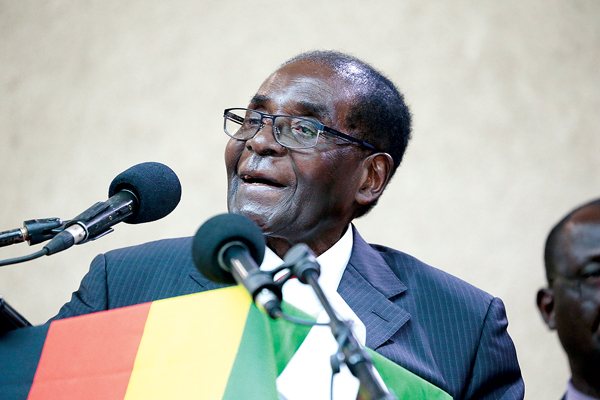
President Robert Mugabe was yesterday left with a bloody nose after the government spectacularly capitulated to civil servants’ demands to pay 2016 bonuses in cash, it has been learnt.
By PAIDAMOYO MUZULU

The move averted a potentially crippling nationwide strike that could have brought Mugabe’s administration to its knees.
But, the government requested to stagger the payments beginning in April with the last batch being paid at the end of August.
The bonus payments that Finance minister Patrick Chinamasa has, on two occasions in the past two years, unsuccessfully proposed to shelve, will further widen the 2017 budget deficit to an unsustainable $580 million and compromise economic recovery.
Public Service minister Prisca Mupfumira, flanked by Chinamasa and Reserve Bank governor John Mangudya, announced the climbdown.
“We have agreed to pay bonuses in cash and the payments would be staggered beginning end of April, May, June and August,” she said.
According to Mupfumira, Mugabe, acutely sensitive to the political dangers of having an angry security service, will pay the uniformed forces their bonuses ahead of the rest of the civil servants.
- Chamisa under fire over US$120K donation
- Mavhunga puts DeMbare into Chibuku quarterfinals
- Pension funds bet on Cabora Bassa oilfields
- Councils defy govt fire tender directive
Keep Reading
“The first to be paid in April will be defence forces and health personnel. In May we will pay police and prison services. Teachers would be paid end of June, while the rest of the civil service would be paid end of August,” Mupfumira said.
Chinamasa said the staggering was necessitated by the dire cashflow problems Treasury was facing.
“Budgetary constraints are the reason for the staggering because it was not feasible to pay the $180 million at once,” Chinamasa said.
In March 2015 and September last year, Chinamasa announced the suspension of civil servants’ bonuses, but on both occasions a belligerent Mugabe slammed him and reversed the decision.
Chinamasa was not forthcoming on the source of funding the bonuses at a time government spending on salaries has ballooned to around 97% of its income.
“We will have to mobilise the money somehow,” Chinamasa opined.
The government has over the past two years relied on issuing Treasury Bills to fund the budget gap, thereby further escalating domestic debt to around $7 billion.
Mangudya acknowledged that Zimbabwe was in a catch-22 situation as it did not have the physical cash to honour cash on demand.
“We know the exact state of affairs and we came in to explain that. It would have been unfair not to include us. The banks need to have the physical cash to make the payments, not the virtual money that is reflected in their accounts,” Mangudya said.
Progressive Teachers’ Union of Zimbabwe secretary-general Raymond Majongwe described the government climbdown as victory for united workers in the face of an “abusive employer”.
“We showed a united brave face and our demand to be paid in cash has been met. Government should not abuse its workers and it should know they cannot create conditions. We need to engage,” Majongwe said.
Yesterday, the Amalgamated Rural Teachers’ Union of Zimbabwe (ARTUZ) claimed teachers in rural areas had responded to their call for a sit-in despite intimidation.
ARTUZ leader Obert Masaraure said the majority of teachers braved massive intimidation to make their point heard.
“Reports reaching the ARTUZ command centre are that the government has deployed thousands of Civil Service Commission officers across the country working in cahoots with Central Intelligence Organisation operatives and Police Internal Security Intelligence officers. These are moving around threatening teachers, nurses, agricultural extension workers and other civil servants,” he said.
Masaraure said the floods that have hit most parts of the country had worked in civil servants’ favour as “these agents of darkness” did not have access to large parts of Masvingo, Midlands, Matabeleland South and Matabeleland North provinces.











